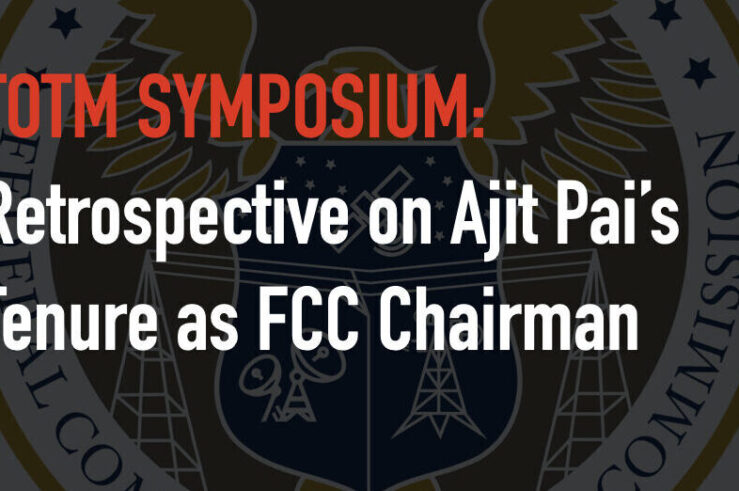Showing results for: “european commission sep”
Taking Cost-Benefit Analysis Seriously in Consumer-Data Regulation
In its Advance Notice for Proposed Rulemaking (ANPR) on Commercial Surveillance and Data Security, the Federal Trade Commission (FTC) has requested public comment on an unprecedented initiative to promulgate and implement wide-ranging rules concerning the gathering and use of consumer data in digital markets. In this contribution, I will assume, for the sake of argument, ... Taking Cost-Benefit Analysis Seriously in Consumer-Data Regulation
Separation without a Breakup
[This post is the fourth in an ongoing symposium on “Should We Break Up Big Tech?“that features analysis and opinion from various perspectives.] [This post is authored by Pallavi Guniganti, editor of Global Competition Review.] Start with the assumption that there is a problem The European Commission and Austria’s Federal Competition Authority are investigating Amazon ... Separation without a Breakup
A Reflection on Commissioner Pai, Chairman Pai, and Public Service
Much of this symposium celebrates Ajit’s contributions as chairman of the Federal Communications Commission and his accomplishments and leadership in that role. And rightly so. But Commissioner Pai, not just Chairman Pai, should also be recognized. I first met Ajit when we were both minority commissioners at our respective agencies: the FCC and Federal Trade ... A Reflection on Commissioner Pai, Chairman Pai, and Public Service
Finding your way in the seeds/agro-chem mergers labyrinth
The recently notified mergers in the seed and agro-chem industry raise difficult questions that competition authorities around the world would need to tackle in the following months. Because of the importance of their markets’ size, the decision reached by US and EU competition authorities would be particularly significant for the merging parties, but the perspective ... Finding your way in the seeds/agro-chem mergers labyrinth
Apple Fined at the 11th Hour Before the DMA Enters into Force
Just days before the EU’s Digital Markets Act (DMA) was set to enter into force, the European Commission hit Apple—one of the six designated “gatekeepers” to which the new law will apply—with a hefty €1.8 billion fine for the kinds of anti-steering provisions that will be banned by the DMA, which enters into force on ... Apple Fined at the 11th Hour Before the DMA Enters into Force
Section 5 of the FTC Act and monopolization cases: A brief primer
In the past two weeks, Members of Congress from both parties have penned scathing letters to the FTC warning of the consequences (both to consumers and the agency itself) if the Commission sues Google not under traditional antitrust law, but instead by alleging unfair competition under Section 5 of the FTC Act. The FTC is rumored to be ... Section 5 of the FTC Act and monopolization cases: A brief primer
Enforcing the DMA is Easier Said Than Done: Evidence From the Commission’s Draft Template for DMA Compliance Reports
The European Commission early last month published its draft template for DMA-compliance reports. This is the document that gatekeepers will periodically need to fill out, and which subsequently will be used to determine whether they comply with the European Union’s Digital Markets Act (DMA). The draft template is a missed opportunity to clarify some of ... Enforcing the DMA is Easier Said Than Done: Evidence From the Commission’s Draft Template for DMA Compliance Reports
Why FTC Competition Rulemaking Likely Will Fail
I. Introduction In over a century of existence, the U.S. Federal Trade Commission (FTC) has been a policy leader in developing American thinking about and in enforcing antitrust and consumer protection laws pursuant to several specific statutory mandates. It has also promulgated a substantial number of consumer protection rules, dealing with a wide variety of practices. ... Why FTC Competition Rulemaking Likely Will Fail
Evading Section Two, Two Ways: The Commission's Cases Against McCormick and Intel
Yesterday, in my contribution to the Antitrust & Competition Policy Blog’s Section 5 symposium, I discussed the FTC’s use of Section 5 to evade the tough standards facing plaintiffs bringing Section 2 claims and how that evasion was likely to cost consumers by stripping out the error-cost protections embedded in modern monopolization law. I also ... Evading Section Two, Two Ways: The Commission's Cases Against McCormick and Intel
‘New Madison Approach’ Should Be Retained to Promote American Innovation
The leading contribution to sound competition policy made by former Assistant U.S. Attorney General Makan Delrahim was his enunciation of the “New Madison Approach” to patent-antitrust enforcement—and, in particular, to the antitrust treatment of standard essential patent licensing (see, for example, here, here, and here). In short (citations omitted): The New Madison Approach (“NMA”) advanced ... ‘New Madison Approach’ Should Be Retained to Promote American Innovation
DMA: Setting the Goalposts
In a little less than a month, the European Union’s Digital Markets Act (DMA) will start to bite, but how will it taste? By March 7, companies that were designated as “gatekeepers” in September 2023 will be required to meet the obligations of Articles 5, 6, and 7 of the DMA Regulation. With the exception ... DMA: Setting the Goalposts
Price-Parity Clauses: The Good, The Bad, and the…Anticompetitive?
Price-parity clauses have, until recently, been little discussed in the academic vertical-price-restraints literature. Their growing importance, however, cannot be ignored, and common misconceptions around their use and implementation need to be addressed. While similar in nature to both resale price maintenance and most-favored-nations clauses, the special vertical relationship between sellers and the platform inherent in ... Price-Parity Clauses: The Good, The Bad, and the…Anticompetitive?










